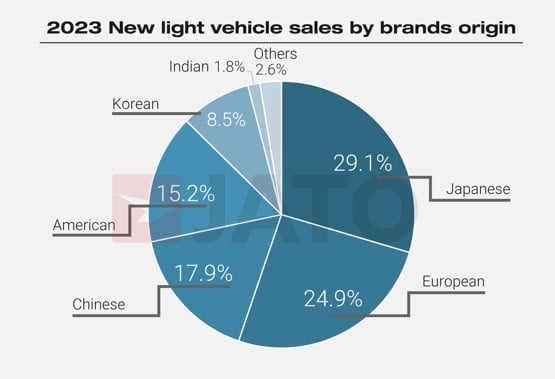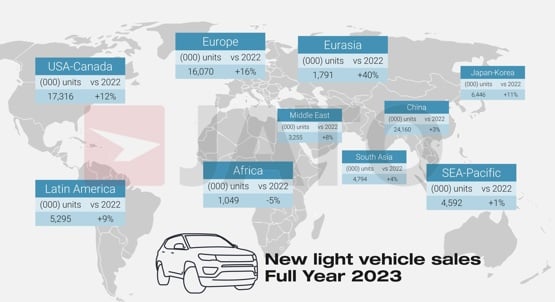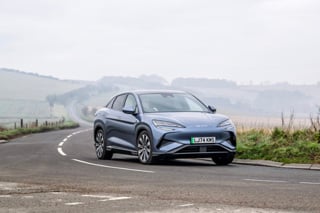Chinese car brands increased their market share in the global new car market, last year, overtaking American brands for the first time.
Analysis by Jato Dynamics found that Chinese-origin brands sold 13.43 million new cars in 2023, up by 23%, while American brands sold 11.93 million units, up by 9% from 2022.
The market share of Chinese car brands soared across regions such as the Middle East, Eurasia, and Africa, while posting growth in Latin America and Southeast Asia. These cars also gained share in developed economies, including Europe, Australia, New Zealand, and Israel. In contrast, the US and India saw little uptake of Chinese cars, similarly to Korea and Japan.
Felipe Munoz, senior analyst at JATO Dynamics, said: “As the domestic market shows signs of deceleration, Chinese manufacturers are searching for sources of growth abroad. Ambitions to develop a presence in the US and Europe have been disrupted by robust policy measures designed to protect legacy manufacturers.
"Chinese brands have already been successful across the emerging economies due to easier access policies, lower trade barriers, and higher price sensitivities among consumers. The EU decision to impose tariffs of up to 38% on imported Chinese EVs from as soon as July this year offers fresh rationale for a continuation of this strategy.”

While the industry generally focuses its attention on the European, US, and Chinese automotive markets, 22% of new car sales in 2023 came from emerging economies.
Munoz stated: “Over 17.5 million new cars were sold in the emerging economies in 2023. That is more than the total sales in US or Europe during the year.”
India led this group by a significant margin. As the fourth-largest individual market in 2023, it sold 4.19 million passenger cars. Brazil and Iran followed with 2.12 million units and an estimated 1.43 million units, respectively. 1.30 million units were sold in Mexico, while Turkey accounted for 984,000 units.
Munoz continued: "Negligence from legacy automakers, which has resulted in consistently high car prices, has inadvertently driven consumers towards more affordable Chinese alternatives. As car prices continue to rise elsewhere, Chinese car brands are capitalising on this trend to gain market traction at a much faster pace."
Despite facing many challenges, the global automotive industry performed well in 2023. According to JATO Dynamics data and estimations for 151 markets across the world, a total of 78.32 million new passenger cars were sold last year. This marks an increase of almost seven million units from 2022 - a 10% increase.

SUVs gain further traction
With 36.72 million units sold last year, not only did SUVs post a new sales record but also recorded their highest ever market share.
Between 2022 and 2023, SUV volumes increased by 16%, accounting for closer to 47% of the total global passenger car sales last year. Growth was largely due to the success of Tesla in the SUV segment (+62%), alongside increased demand in Europe, India, the Middle East, and Eurasia. China and USA-Canada remained the largest markets for SUVs, accounting for 54% of the global total.
Munoz said, “This is no longer a new trend. Manufacturers producing SUVs have been proactive in evolving their models in recent years, ensuring they offer versatility and appealing new designs.”
Among the top 10 largest car makers in 2023, Hyundai-Kia was most dependent on sales of SUVs, with these vehicles accounting for 56% of its passenger car sales, followed by Ford (49%), and Volkswagen Group (48%).
Tesla Model Y becomes world’s best-selling vehicle
As anticipated in JATO’s preliminary 2023 results, released in February, the Tesla Model Y made history last year. The mid-size SUV secured top position in the global ranking as the first ever pure electric vehicle to lead the global market. It secured this position without a presence in most emerging markets, where it continues to be unaffordable for the majority of consumers.
Munoz stated: “Tesla is a brand made for the developed world. While it cannot currently target these markets, there is potential for emerging markets to be explored as an additional source of growth in the future.”
Sales of the Tesla Model Y totaled 1.22 million units globally, up by 64% from 2022, or 480,000 more units than 2021—a result achieved by no other manufacturer before. Consequently, the Model Y managed to outsell traditional global top-sellers like Toyota’s RAV4 and Corolla sedan.






















Login to comment
Comments
No comments have been made yet.